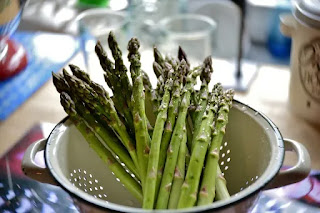3. Asparagus accounts for a significant portion of your daily nutritional needs. As we studied different nutrients and where they could be found in plant foods, asparagus was almost always on the list. It is almost like a multi-vitamin. “According to the reference daily intake (RDI) issued by the Food and Nutrition Board of the Institute of Medicine, asparagus accounts for a significant portion of your daily nutritional needs, Based on a 2,000-calorie diet, the RDI [Recommended daily intake] breaks down as follows [for what appears to be a heaping serving of asparagus—maybe 5-6 spears]:
Vitamin A: 18% of the RDI
Vitamin C: 12% of the RDI
Vitamin E: 7% of the RDI
Vitamin K: 57% of the RDI
Folate (vitamin B9): 34% of the RDI
Phosphorous: 5% of the RDI
Potassium: 6% of the RDI
Asparagus also offers ample supplies of riboflavin (vitamin B2), thiamine (vitamin B1), and iron.” 4
4. Nutritionally speaking, asparagus is extremely well-balanced, anti-inflammatory and good for the brain. “High in vitamin K and folate (vitamin B9) [which can prevent neural tube defects in the fetus], asparagus is extremely well balanced, even among nutrient-rich vegetables.’ Asparagus is high in anti-inflammatory nutrients,’ said San Diego-based nutritionist Laura Flores. It also ‘provides a wide variety of antioxidant nutrients, including vitamin C, beta-carotene, vitamin E, and the minerals zinc, manganese and selenium.’"
“Furthermore, the vegetable contains the amino acid asparagine, which is important in the development and function of the brain, according to a study published in 2013 in the journal Neuron. It also contains chromium, a trace mineral that helps insulin do its job transporting glucose. It's also especially rich in glutathione, a detoxifying compound that can help destroy carcinogens. For this reason, asparagus may help fight or protect against certain cancers, including bone, breast, lung and colon cancers.”5
5. Remember, asparagus contains vitamin E and it’s filled with vitamin K. “Asparagus is also a source of vitamin E, another important antioxidant. This vitamin helps strengthen your immune system and protects cells from the harmful effects of free radicals.
Along with other green, leafy vegetables, asparagus is a good source of vitamin K. The vitamin is crucial for coagulation (which helps your body stop bleeding after a cut) as well as bone health.
‘Most people think of calcium for healthy bones, but vitamin K is also important,’ says Gans. ‘It can actually help your body absorb calcium.’”6
6. You don’t have to buy asparagus organic! “Asparagus is a ‘Clean 15’ vegetable because it has a low pesticide load and is one of the safest conventionally grown crops to consume. According to Dr. Andrew Weil, it is a food that does not need to be purchased organic.”7
7. “The good Lord made it, and we should eat it.” to quote my grandfather, a Greek chef. Genesis 3:18 says “… thou shalt eat the herb of the field;” also reminds us that asparagus (and other veggies) are included in God’s plan for good health.
1 – http://www.whfoods.com/genpage.php?tname=foodspice&dbid=12
2 – https://www.myhdiet.com/healthnews/ampm/natural-sources-glutathione/
3 – Drug Muggers, Suzy Cohen, RPh, pg. 142
4 – https://www.verywellfit.com/asparagus-nutrition-facts-calories-and-their-health-benefits-4118017
5 – https://www.livescience.com/45295-asparagus-health.html
6 – https://www.health.com/nutrition/asparagus-health-benefits
7 – http://www.michiganasparagus.org/recent-news/2015/5/26/the-clean-15
Disclaimer: This article is for educational purposes only. The use or misuse of any information contained in this article is at the sole risk of the user.
_______________________________________________________
PLEASE DONATE TODAY, IF the Holy Spirit impresses you, (donate button below and on the side) so I can continue to help others. Thank you! If you can't see the donate button or want quick access – use this link: PayPal.Me/ReneeB
Got info from: Dallas Roberts Newsletter March, 2020

No comments:
Post a Comment